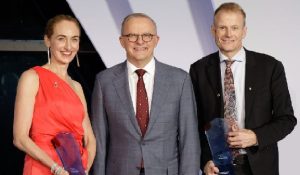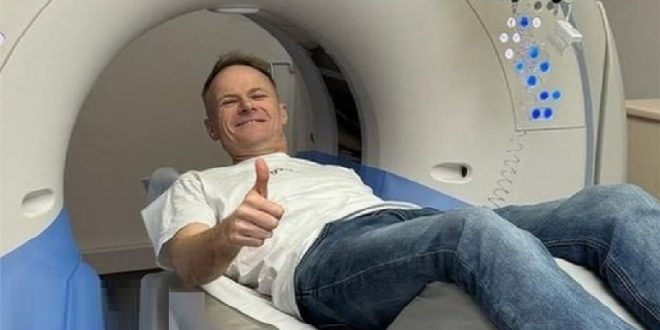04-02-2024
Bureau Report + Agencies
MELBOURNE: On opposite sides of the world, Richard Scolyer and Georgina Long each took one look at a scan and their hearts sank.
In front of them was, to the untrained eye, an innocuous-looking brain but these long-time friends both leading skin cancer doctors feared it held a ticking time bomb.
 Nestled in the top right corner of Prof Scolyer’s skull was a section of matter lighter and cloudier than the rest.
Nestled in the top right corner of Prof Scolyer’s skull was a section of matter lighter and cloudier than the rest.
“I’m no expert in radiology, but… in my heart I knew it was a tumour,” he tells media.
Neurosurgeons soon confirmed it wasn’t just any brain tumour, but “the worst of the worst”, a subtype of glioblastoma so aggressive most patients survive less than a year.
Devastated but determined, he and Prof Long set out to do the impossible: to save his life by finding a cure and it may sound crazy, but the Australian researchers have done it before, with melanoma.
“It didn’t sit right with me… to just accept certain death without trying something,” Prof Scolyer says.
“It’s an incurable cancer? Well bugger that!”
Thirty years ago, when Prof Scolyer and Prof Long met as bright, young doctors, advanced melanoma was a death sentence but that’s exactly what drew them to it.
Australia has long had the highest rate of the skin cancer on the planet and where many saw a daunting challenge, they saw potential.
“(Back) when I was doing the cancer block the most challenging patients to see were the ones with advanced melanoma. It was heartbreaking,” Prof Long says.
“I wanted to make a difference.”
 Today, it’s near impossible to overstate their impact on the field.
Today, it’s near impossible to overstate their impact on the field.
Anyone who gets a diagnosis or treatment for melanoma worldwide does so because of the work pioneered by the Melanoma Institute that they now lead.
Over the past decade, their team’s research on immunotherapy, which uses the body’s immune system to attack cancer cells, has dramatically improved outcomes for advanced melanoma patients around the world. Half are now essentially cured, up from less than 10%.
That breakthrough or as Prof Long calls it, “penicillin moment” is now being applied to many other cancers, saving even more lives.
It has made the duo national treasures. Almost every Australian would know someone impacted by their work and this year they’ve been jointly named as the Australians of the Year but as they were transforming the field, they were also leaving their mark on each other.
They bonded over frustration at the cases they couldn’t crack, the highs of life-changing discoveries, a love of exercise, and a lofty ambition of reaching zero melanoma deaths in Australia.
“We’re very different but very similar in that sort of… roll up your sleeves, get things done way,” Prof Long says.
Eyes shining, the medical oncologist rattles off a list of qualities brave, honest, upbeat, driven which make Prof Scolyer the dream colleague and friend.
“He’s a delight,” she surmises and so, after she received that fateful call from Poland last June where Prof Scolyer was on holiday when a seizure triggered his diagnosis she spent the night crying.
“I’m grieving… I’m thinking my friend is going to be gone in 12 months.”
 Pressmediaofindia
Pressmediaofindia




